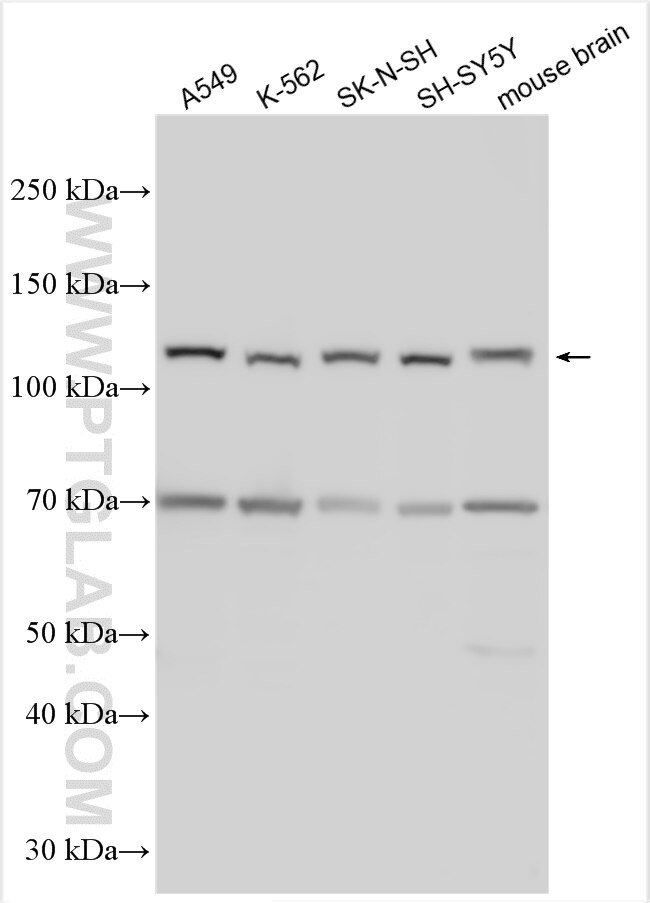Validation Data Gallery
Tested Applications
| Positive WB detected in | A549 cells, K-562 cells, SK-N-SH cells, SH-SY5Y cells, mouse brain tissue |
Recommended dilution
| Application | Dilution |
|---|---|
| Western Blot (WB) | WB : 1:500-1:2000 |
| It is recommended that this reagent should be titrated in each testing system to obtain optimal results. | |
| Sample-dependent, Check data in validation data gallery. | |
Product Information
24314-1-AP targets PCDHAC1 in WB, ELISA applications and shows reactivity with human, mouse samples.
| Tested Reactivity | human, mouse |
| Host / Isotype | Rabbit / IgG |
| Class | Polyclonal |
| Type | Antibody |
| Immunogen |
CatNo: Ag19431 Product name: Recombinant human PCDHAC1 protein Source: e coli.-derived, PGEX-4T Tag: GST Domain: 20-256 aa of BC136774 Sequence: GQLEYSVPEETERGVAVGNLSADLRLPAAAMSSRNFRFLSSHRELYFGVDLPSGNLVVREPADREQLCRAKAACVLTYDLVLEDPLELHKIRIHVLDTNDNSPLFPAGDVQLHIPEFLTPGARFTLPNAQDDDEGSNGILSYSLSPSQHFRLDMGSRVDGSEYPELVLEKALDREQRATHLLVLTARDGGLPARSGDAQVTIIVVDTNDNAPVFERSVYRTKVPETAPNGTVLFRVQ 相同性解析による交差性が予測される生物種 |
| Full Name | protocadherin alpha subfamily C, 1 |
| Calculated molecular weight | 818 aa, 88 kDa |
| Observed molecular weight | ~110 kDa |
| GenBank accession number | BC136774 |
| Gene Symbol | PCDHAC1 |
| Gene ID (NCBI) | 56135 |
| RRID | AB_3085730 |
| Conjugate | Unconjugated |
| Form | |
| Form | Liquid |
| Purification Method | Antigen affinity purification |
| UNIPROT ID | Q9H158 |
| Storage Buffer | PBS with 0.02% sodium azide and 50% glycerol{{ptg:BufferTemp}}7.3 |
| Storage Conditions | Store at -20°C. Stable for one year after shipment. Aliquoting is unnecessary for -20oC storage. |
Background Information
Protocadherins, which constitute the largest subgroup within the cadherin superfamily, are predominantly expressed in the nervous system and are probably involved in the regulation of neuronal recognition and connectivity (PMID: 17936607; 12231349; 17133224). The protocadherin subfamily can be further subdivided into three groups: the clustered protocadherins, comprising α-, β- and γ-protocadherins; δ-protocadherins; and others, many of which are solitary (PMID: 17133224). PCDHAC1 belongs to the α-protocadherin (PCDHA) cluster. The differential expression of PCDHAC1 may be related to the influence of maternal cadmium on fetal growth (PMID: 27544570).
Protocols
| Product Specific Protocols | |
|---|---|
| WB protocol for PCDHAC1 antibody 24314-1-AP | Download protocol |
| Standard Protocols | |
|---|---|
| Click here to view our Standard Protocols |

